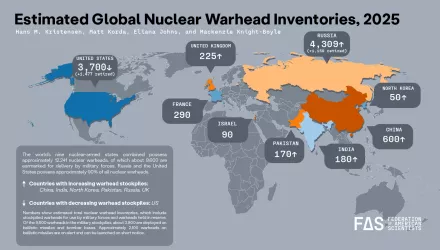North Korean technicians are reportedly in the final stages of fueling a long-range ballistic missile that some experts estimate can deliver a deadly payload to the United States. The last time North Korea tested such a missile, in 1998, it sent a shock wave around the world, but especially to the United States and Japan, both of which North Korea regards as archenemies. They recognized immediately that a missile of this type makes no sense as a weapon unless it is intended for delivery of a nuclear warhead.
A year later North Korea agreed to a moratorium on further launches, which it upheld — until now. But there is a critical difference between now and 1998. Today North Korea openly boasts of its nuclear deterrent, has obtained six to eight bombs' worth of plutonium since 2003 and is plunging ahead to make more in its Yongbyon reactor. The six-party talks aimed at containing North Korea's weapons of mass destruction have collapsed.
Should the United States allow a country openly hostile to it and armed with nuclear weapons to perfect an intercontinental ballistic missile capable of delivering nuclear weapons to U.S. soil? We believe not. The Bush administration has unwisely ballyhooed the doctrine of "preemption," which all previous presidents have sustained as an option rather than a dogma. It has applied the doctrine to Iraq, where the intelligence pointed to a threat from weapons of mass destruction that was much smaller than the risk North Korea poses. (The actual threat from Saddam Hussein was, we now know, even smaller than believed at the time of the invasion.) But intervening before mortal threats to U.S. security can develop is surely a prudent policy.
Therefore, if North Korea persists in its launch preparations, the United States should immediately make clear its intention to strike and destroy the North Korean Taepodong missile before it can be launched. This could be accomplished, for example, by a cruise missile launched from a submarine carrying a high-explosive warhead. The blast would be similar to the one that killed terrorist leader Abu Musab al-Zarqawi in Iraq. But the effect on the Taepodong would be devastating. The multi-story, thin-skinned missile filled with high-energy fuel is itself explosive — the U.S. airstrike would puncture the missile and probably cause it to explode. The carefully engineered test bed for North Korea's nascent nuclear missile force would be destroyed, and its attempt to retrogress to Cold War threats thwarted. There would be no damage to North Korea outside the immediate vicinity of the missile gantry.
The U.S. military has announced that it has placed some of the new missile defense interceptors deployed in Alaska and California on alert. In theory, the antiballistic missile system might succeed in smashing into the Taepodong payload as it hurtled through space after the missile booster burned out. But waiting until North Korea's ICBM is launched to interdict it is risky. First, by the time the payload was intercepted, North Korean engineers would already have obtained much of the precious flight test data they are seeking, which they could use to make a whole arsenal of missiles, hiding and protecting them from more U.S. strikes in the maze of tunnels they have dug throughout their mountainous country. Second, the U.S. defensive interceptor could reach the target only if it was flying on a test trajectory that took it into the range of the U.S. defense. Third, the U.S. system is unproven against North Korean missiles and has had an uneven record in its flight tests. A failed attempt at interception could undermine whatever deterrent value our missile defense may have.
We should not conceal our determination to strike the Taepodong if North Korea refuses to drain the fuel out and take it back to the warehouse. When they learn of it, our South Korean allies will surely not support this ultimatum — indeed they will vigorously oppose it. The United States should accordingly make clear to the North that the South will play no role in the attack, which can be carried out entirely with U.S. forces and without use of South Korean territory. South Korea has worked hard to counter North Korea's 50-year menacing of its own country, through both military defense and negotiations, and the United States has stood with the South throughout. South Koreans should understand that U.S. territory is now also being threatened, and we must respond. Japan is likely to welcome the action but will also not lend open support or assistance. China and Russia will be shocked that North Korea's recklessness and the failure of the six-party talks have brought things to such a pass, but they will not defend North Korea.
In addition to warning our allies and partners of our determination to take out the Taepodong before it can be launched, we should warn the North Koreans. There is nothing they could do with such warning to defend the bulky, vulnerable missile on its launch pad, but they could evacuate personnel who might otherwise be harmed. The United States should emphasize that the strike, if mounted, would not be an attack on the entire country, or even its military, but only on the missile that North Korea pledged not to launch -- one designed to carry nuclear weapons. We should sharply warn North Korea against further escalation.
North Korea could respond to U.S. resolve by taking the drastic step of threatening all-out war on the Korean Peninsula. But it is unlikely to act on that threat. Why attack South Korea, which has been working to improve North-South relations (sometimes at odds with the United States) and which was openly opposing the U.S. action? An invasion of South Korea would bring about the certain end of Kim Jong Il's regime within a few bloody weeks of war, as surely he knows. Though war is unlikely, it would be prudent for the United States to enhance deterrence by introducing U.S. air and naval forces into the region at the same time it made its threat to strike the Taepodong. If North Korea opted for such a suicidal course, these extra forces would make its defeat swifter and less costly in lives — American, South Korean and North Korean.
This is a hard measure for President Bush to take. It undoubtedly carries risk. But the risk of continuing inaction in the face of North Korea's race to threaten this country would be greater. Creative diplomacy might have avoided the need to choose between these two unattractive alternatives. Indeed, in earlier years the two of us were directly involved in negotiations with North Korea, coupled with military planning, to prevent just such an outcome. We believe diplomacy might have precluded the current situation. But diplomacy has failed, and we cannot sit by and let this deadly threat mature. A successful Taepodong launch, unopposed by the United States, its intended victim, would only embolden North Korea even further. The result would be more nuclear warheads atop more and more missiles.
Ashton B. Carter was assistant secretary of defense under President Bill Clinton and William J. Perry was secretary of defense. The writers, who conducted the North Korea policy review while in government, are now professors at Harvard and Stanford, respectively.
Please see the pdf below for the full text of this article:
Carter, Ash and Dr. William J. Perry. “If Necessary, Strike and Destroy: North Korea Cannot Be Allowed to Test This Missile.” The Washington Post, June 22, 2006






